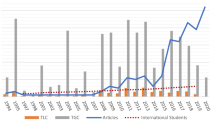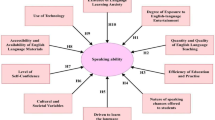Abstract
This case study aims to reveal how conceptualization of native speakership was constructed and reinforced in a South Korean university classroom of English as a foreign language (EFL). In addition, it examines how this conceptualization positions native speakers, a non-native EFL teacher, and learners, and what learning opportunities were provided in this classroom. The participants of the study were one instructor and his students. The data include classroom observations, interviews with the teacher and students, and student surveys. The findings indicate that the students had been exposed to American English more frequently than any other English variety. Also, they wanted to learn American English in and outside of the classroom. Furthermore, this study shows that American English norms were revealed in the teacher’s beliefs and reinforced in his classroom through his instructional materials, classroom practices, and evaluation of the students. Thus, as a mediator between native speakers and learners, the teacher positioned native speakers as authoritative possessors of correct pronunciation and expressions for his students to imitate. Consequently, the students learned about pronunciation and informal expressions as modeled by American native speakers rather than learning to use the L2 communicatively as recommended by the institutional policy. This study has important implications for English language teaching in South Korea, specifically in terms of the concepts of native speakership, student learning, and teacher education.
Similar content being viewed by others
Notes
In terms of accent, Smith (1996) mentioned that Standard English is often connected with the Received Pronunciation accent or BBC English accent. For American English, a Midwestern accent is often considered the standard.
All the interviews were conducted in Korean, and for this paper, the interview excerpts were translated into English. In all the excerpts, statements are bolded and italicized to focus the readers’ attention.
The 29 expressions that the teacher covered under the category of “slang” included idioms and informal language as well as slang expressions. Thus, in this paper, “slang” that the teacher mentioned was interpreted as informal (conversational) expressions/language.
The teacher may know that there exist diverse local dialects in American English and assume that Standard American English is spoken in areas such as the East Coast (where economically important major cities such as New York City as well as the national capital, Washington, DC, are located). This seems to be related to Korean language policy: Standard Korean officially refers to the Korean variety spoken and written by educated middle-class people living in Seoul, which is the capital of Korea as well as the country’s biggest city.
Korean was the medium of instruction in this class. For this paper, English translation for classroom discourse is provided and English utterances are underlined. In the classroom excerpts, T stands for Mr. Nam, S for one student, and Ss for several students. Also, ^ indicates a pitch peak; [, overlapping speech; and (.), short pause. Uppercase letters mean increased volume of the utterance. In (()), various contextual events are noted, usually only when they affect comprehension of the surrounding discourse. The utterance in {} was made by students.
Normally, only North Americans flap the t, and to an American, not flapping the t would not be considered bad English, though it would be regarded English from another country.
References
Amin, N. (2000). Negotiating nativism: Minority immigrant women ESL teachers and the native speaker construct. Unpublished doctoral dissertation, University of Toronto, Ontario, Canada.
Baik, M. J. (1992). Language shift and identity in Korea. Journal of Asian Pacific Communication, 3, 15–31.
Baik, M. J. (1995). Language, ideology, and power: English textbooks of two Koreas. Seoul, Korea: Thaehaksa.
Belz, J. A. (2002). Second language play as a representation of the multicompetent self in foreign language study. Journal for Language, Identity, and Education, 1, 13–39.
Birdsong, D. (2004). Second language acquisition and ultimate attainment. In A. Davies & C. Elder (Eds.), Handbook of applied linguistics (pp. 82–105). New York: Blackwell.
Birdsong, D. (2006). Age and second language acquisition and processing: A selective overview. Language Learning, 56(S1), 9–49.
Bloomfield, L. (1933). Language. New York: Holt, Rinehart & Winston.
Blyth, C. (1995). Redefining the boundaries of language use: The foreign language classroom as a multilingual speech community. In C. J. Kramsch (Ed.), Redefining the boundaries of language study (pp. 145–183). Boston, MA: Heinle & Heinle.
Bogdan, R. B., & Biklin, S. K. (1998). Qualitative research for education: An introduction to theory and methods (3rd ed.). Needham Heights, MA: Allyn & Bacon.
Braine, G. (Ed.). (1999). Non-native educators in English language teaching. Mahwah, NJ: Lawrence Erlbaum.
Choe, H. (2007). Korean EFL teachers’ perception of English speakers and varieties. Foreign Languages Education, 14(1), 85–107.
Chomsky, N. (1965). Aspects of the theory of syntax. Cambridge, MA: MIT Press.
Collins, S. G. (2005). ‘Who’s this tong-il?’: English, culture, and ambivalence in South Korea. Changing English, 12, 417–429.
Cook, V. (1991). The poverty-of-the-stimulus argument and multi-competence. Second Language Research, 7, 103–117.
Cook, V. (1999). Going beyond the native speaker in language teaching. TESOL Quarterly, 33, 185–209.
Crismore, A., Ngeow, K. Y.-H., & Soo, K.-S. (1996). Attitudes toward English in Malaysia. World Englishes, 15(3), 319–335.
Crystal, D. (2003). English as a global language (2nd ed.). Cambridge: Cambridge University press.
Davies, A. (2004). The native speaker in applied linguistics. In A. Davies & C. Elder (Eds.), Handbook of applied linguistics (pp. 431–450). New York: Blackwell.
Erickson, F. (1973). What makes school ethnography “ethnographic”? Anthropology and Education Quarterly, 4(2), 10–19.
Eun, J.-O. (2003). How idealized American English norms are created and reinforced in English lessons on television: A discourse analysis of two popular English language TV shows in Korea. Unpublished doctoral dissertation, The Pennsylvania State University, University Park, PA.
Ferguson, C. A. (1982). Foreword. In B. B. Kachru (Ed.), The other tongue: English across cultures (pp. vii–xi). Urbana, IL: The University of Illinois Press.
Firth, A., & Wagner, J. (1997). On discourse, communication, and (some) fundamental concepts in SLA research. Modern Language Journal, 81, 285–300.
Flattery, B. (2007). Language, culture, and pedagogy: An overview of English in South Korea. Retrieved March 1, 2008, from http://www.chass.utoronto.ca/~cpercy/courses/eng6365-flattery.htm.
Freeman, D., & Johnson, K. E. (2005). Toward linking teacher knowledge and student learning. In D. J. Tedick (Ed.), Second language teacher education: International perspectives (pp. 73–95). Mahwah, NJ: Lawrence Erlbaum.
Friedrich, P. (1997). A profile of Brazilian EFL learners and their attitudes towards the target language. Unpublished master’s thesis, Purdue University, West Lafayette, IN.
Glaser, B., & Strauss, A. (1967). The discovery of grounded theory: Strategies for qualitative research. New York: Aldine.
Goetz, J., & LeCompte, M. (1981). Ethnographic research and the problem of data reduction. Anthropology and Education Quarterly, 12, 51–70.
Jenkins, J. (1998). Which pronunciation norms and models for English as an International Language? ELT Journal, 52, 119–126.
Jung, K. T. (1998). Contact and convergence of English in Korea. Unpublished doctoral dissertation. University of Illinois, Urbana-Champaign, IL.
Kachru, B. B. (1976). Models of English for the Third World: White man’s linguistic burden or language pragmatics? TESOL Quarterly, 10(2), 221–239.
Kachru, B. B. (1984). World Englishes and the teaching of English to non-native speakers: Contexts, attitudes, and concerns. TESOL Newsletter, 18(5), 25–26.
Kachru, B. B. (1985). Standards, codification, and sociolinguistic realism: The English language in the outer circle. In R. Quirk & H. Widdowson (Eds.), English in the world: Teaching and learning of language and literature (pp. 11–30). Cambridge: Cambridge University Press.
Kachru, B. B., & Nelson, C. L. (1996). World Englishes. In S. L. McKay & N. H. Hornberger (Eds.), Sociolinguistics and language teaching (pp. 71–102). New York: Cambridge University Press.
Kim, J.-H. (2009, November 16). Hankwuk ywuhaksayng piywul 11.2% sasang choytay [Korean students studying in the U.S. takes 11.2% of international students, which is the highest ever in the Korean educational history]. Hankook Ilbo. Retrieved November 1, 2009, from http://www.koreatimes.com/article/559855.
Ko, K.-S. (2008). The practical teaching of English pronunciation in the elementary school English. Journal of the Korean English Education Society, 7(1), 1–31.
Korean Educational Development Institute. (2009). 2007haknyento cho, cywung, ko ywuhaksayng chwulkwuk mich kwikwuk thongkyey [Statistics of the elementary and secondary school students who departed from or arrived in Korea in 2007]. Retrieved November 1, 2009, from http://www.mest.go.kr/me_kor/student/student1/student16/index.html?ucdA06.
Kramsch, C. (1997). The privilege of the nonnative speaker. PMLA, 112, 359–369.
Kramsch, C. (1998). The privilege of the intercultural speaker. In M. Byran & M. Fleming (Eds.), Language learning in intercultural perspective: Approaches through drama and ethnography (pp. 16–31). Cambridge: Cambridge University Press.
Kwon, O. (2000). Korea’s English education policy changes in the 1990s: Innovations to gear the nation for the 21st century. English Teaching, 55(1), 47–91.
Lincoln, Y. S., & Guba, E. G. (1985). Naturalistic inquiry. Beverly Hills, CA: Sage.
Marinova-Todd, S. (2003). Comprehensive analysis of ultimate attainment in adult second language acquisition. Unpublished doctoral dissertation, Harvard University, Cambridge, MA.
Matsuura, H., Chiba, R., & Yamamoto, A. (1994). Japanese college students’ attitudes towards non-native varieties of English. In D. Graddol & J. Swann (Eds.), Evaluating language (pp. 52–61). Clevedon: BAAL/Multilingual Matters.
Miles, M. B., & Huberman, A. M. (1994). Qualitative data analysis: An expanded sourcebook (2nd ed.). Thousand Oaks, CA: Sage.
Ministry of Education. (1998). Cey chilcha cwunghakko kyoywuk kwaceng haysel (V) [Guide of the 7th middle school curriculum (V)]. Seoul, Korea: Korean Textbook Publisher.
Nunan, D. (2003). The impact of English as a global language on educational policies and practices in the Asia-Pacific Region. TESOL Quarterly, 37(4), 589–613.
Park, S. J., & Abelmann, N. (2004). Class and cosmopolitan striving: Mother’s management of English education in South Korea. Anthropological Quarterly, 77, 645–672.
Piller, I. (2002). Passing for a native speaker: Identity and success in second language learning. Journal of Sociolinguistics, 6, 179–206.
Prator, C. H. (1968). The British heresy in TESL. In J. A. Fishman, C. A. Ferguson, & J. Das Cupta (Eds.), Language problems of developing nations (pp. 459–476). New York: Wiley.
Quirk, R. (1990). Language varieties and standard language. English Today, 21, 3–10.
Shim, R. J., & Baik, M. J. (2000). Korea (South and North). In W. K. Ho & R. Y. L. Wong (Eds.), Language policies and language education: The impact in East Asian countries in the next decade (pp. 173–196). Singapore: Times Academic.
Sinclair, J. (Ed.). (1995). Collins COBUILD English Dictionary (2nd ed.). London: Harper Collins.
Smith, J. (1996). An historical study of English: Function, form and change. London: Routledge.
Soo, K.-S. (1990). Malaysian English at the crosswords: Some signpost. Journal of Multilingual and Multicultural Development, 11(3), 199–214.
Spradley, J. (1979). The ethnographic interview. New York: Holt Rinehart & Winston.
Spradley, J., & McCurdy, D. (1972). The cultural experience: Ethnography in a complex society. Chicago: Science Research Associates.
Stake, R. E. (1995). The art of case study research. Thousand Oaks: Sage.
Stern, H. H. (1983). Fundamental concepts of language teaching. Oxford: Oxford University Press.
Strauss, A., & Corbin, J. (1990). Basics of qualitative research: Grounded theory procedures and techniques. Thousand Oaks, CA: Sage.
Thorne, S. (1997). Mastering advanced English language. New York: Macmillan.
Trudgill, P., & Hannah, J. (2002). International English: A guide to varieties of standard English. London: Arnold.
Yoo, O. K. (2005). Discourses of English as an official language in a monolingual society: The case of South Korea. Second Language Studies, 23(2), 1–44.
Author information
Authors and Affiliations
Corresponding author
Rights and permissions
About this article
Cite this article
Ahn, K. Conceptualization of American English native speaker norms: a case study of an English language classroom in South Korea. Asia Pacific Educ. Rev. 12, 691–702 (2011). https://doi.org/10.1007/s12564-011-9169-6
Received:
Revised:
Accepted:
Published:
Issue Date:
DOI: https://doi.org/10.1007/s12564-011-9169-6




